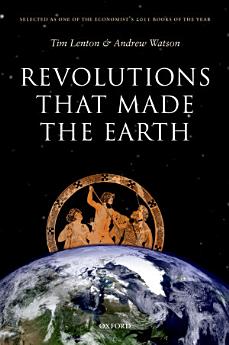Revolutions that Made the Earth
Tim Lenton · Andrew Watson
Apr 2013 · OUP Oxford
5.0star
1 Rezensionreport
E-Book
440
Seiten
family_home
Zulässig
info
reportBewertungen und Rezensionen werden nicht geprüft Weitere Informationen
Über dieses E-Book
The Earth that sustains us today was born out of a few remarkable, near-catastrophic revolutions, started by biological innovations and marked by global environmental consequences. The revolutions have certain features in common, such as an increase in complexity, energy utilization, and information processing by life. This book describes these revolutions, showing the fundamental interdependence of the evolution of life and its non-living environment. We would not exist unless these upheavals had led eventually to 'successful' outcomes - meaning that after each one, at length, a new stable world emerged. The current planet-reshaping activities of our species may be the start of another great Earth system revolution, but there is no guarantee that this one will be successful. The book explains what a successful transition through it might look like, if we are wise enough to steer such a course. This book places humanity in context as part of the Earth system, using a new scientific synthesis to illustrate our debt to the deep past and our potential for the future.
Bewertungen und Rezensionen
5.0
1 Rezension
Autoren-Profil
Tim Lenton is Professor of Earth System Science at the University of East Anglia. His research focuses on understanding the behaviour of the Earth as a whole system, especially through the development and use of Earth system models. He is particularly interested in how life has reshaped the planet in the past, through a series of revolutions in Earth history, and what lessons we can draw from this as we proceed to reshape the planet now. His recent work identifying the tipping elements in the climate system won the Times Higher Education Award for Research Project of the Year 2008. Tim was also awarded a Philip Leverhulme Prize in 2004, a European Geosciences Union Outstanding Young Scientist Award 2006, the British Association Charles Lyell Award Lecture 2006, and the Geological Society of London William Smith Fund 2008. He is a Fellow of the Geological Society of London (2001) and a Fellow of the Linnean Society of London (2009). Andrew Watson holds a Royal Society Research Professorship at the University of East Anglia. His career has spanned planetary and atmospheric sciences, oceanography and climate, giving him a strong interest in the evolution of the Earth system as a whole. After obtaining a BSc in physics from Imperial College, he investigated the history of oxygen in Earth's atmosphere as a PhD student of James Lovelock. He worked on Nasa's Pioneer Venus space mission at the University of Michigan. Returning to England and the marine research laboratories in Plymouth, he developed a new method of tracing large scale water movements. He became a professor at the University of East Anglia in 1996, was elected a Fellow of the Royal Society in 2003, and became a Royal Society Research Professor in 2009. He holds a number of other fellowships and awards.
Dieses E-Book bewerten
Deine Meinung ist gefragt!
Informationen zum Lesen
Smartphones und Tablets
Nachdem du die Google Play Bücher App für Android und iPad/iPhone installiert hast, wird diese automatisch mit deinem Konto synchronisiert, sodass du auch unterwegs online und offline lesen kannst.
Laptops und Computer
Im Webbrowser auf deinem Computer kannst du dir Hörbucher anhören, die du bei Google Play gekauft hast.
E-Reader und andere Geräte
Wenn du Bücher auf E-Ink-Geräten lesen möchtest, beispielsweise auf einem Kobo eReader, lade eine Datei herunter und übertrage sie auf dein Gerät. Eine ausführliche Anleitung zum Übertragen der Dateien auf unterstützte E-Reader findest du in der Hilfe.







